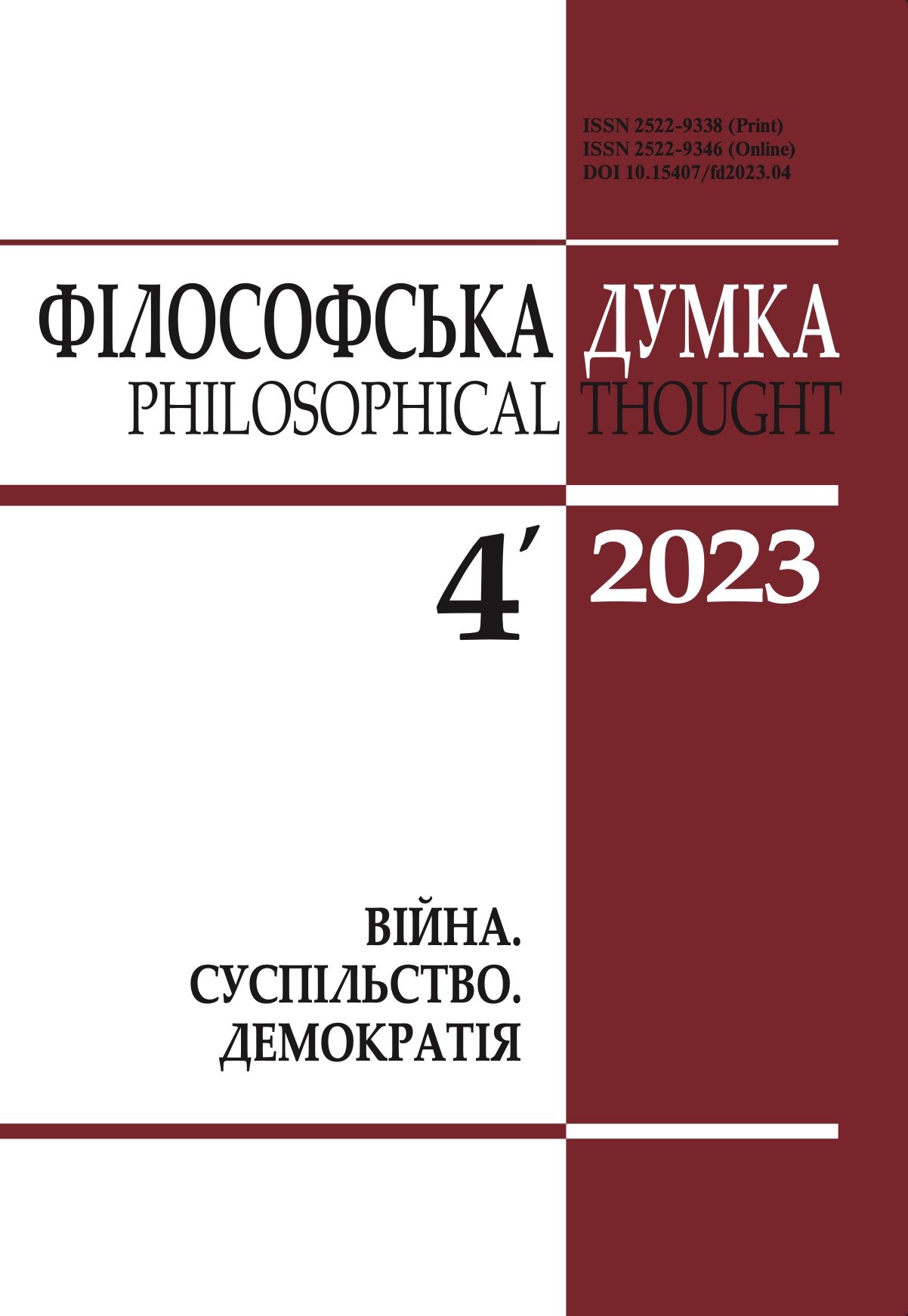European Vector of Hryhorii Skovoroda’s PHilosophy: Resonance of Media Transformations in XVIII century
CONTINUATION OF THE TOPIC. The Philosophy of Hryhorii Skovoroda: History and Modernity
DOI:
https://doi.org/10.15407/fd2023.04.103Keywords:
philosophy of Skovoroda, European perspective, Enlightenment, mediology, culture, education, human, Bible, ancient philosophy, invisibleAbstract
The article proposes the consideration of Skovoroda’s philosophical heritage in the complex contexts of the European philosophical thought in its historical dimension. This complexity was caused through the secular tendency of the Enlightenment ideology with its explanation patterns for human being and social life. The mediological method developed of R. Debray and A. Koschorke is used for analyzing of Skovoroda’s attitudes towards the Enlightenment innovations in cultural and political life. The contemporary narratives of the First, the Second and the Third Enlightenment are applied as pattern for explanation of Skovoroda’s attitude towards the secular trends in the culture and education caused of the Enlightenment ideology. Skovoroda is balancing on the edge of the First and Second Enlightenment: as a philosopher of freedom he makes human responsible for his way of life, but as philosopher of morality he defended the idea of God using the neo-platonic approach. The resurrection of Epicureanism in the Age of Enlightenment was a theoretical challenge for Skovoroda with resonance reactions because his ethical views were based on Epicurus concept of necessity as regulative principle for successful life which can be got without any effort. The religious anthropology developed of Skovoroda is considering in its anthropological-technical aspect. The central ideas of the First Enlightenment — omnipotence of education, disenchanting of religion and project of a new human are rethinking by Skovoroda from the perspective of his religious anthropology with imperatives of self-knowing and making distinction between visual and invisible thereby the way to the eternal truth is possible only possible by the new hermeneutic of the Bible. The semantics and heuristic metaphors in Skovoroda’s works are analyzed, which have a resonance effect with Protestantism and Freema sons ideas, some of which are actualized today.
References
Adorno, Th., Horkheimer, M. (2020). Dialektik der Aufklärung. Frankfurt am Main: Fischer.
Bezenhöfer, U. (1997). Paracelsus. Hamburg: Rowohlt.
Cassirer, E. (2007). Die Philosophie der Aufklärung. Hamburg: Mainer Verlag.
Debray, R. (2004). Transmitting Culture. Columbia: University Press of Columbia
Deichgräber, R. (2000). Mit Ohren des Herzens lauschen. Anleitung zur Meditationen der biblischen Texte. Göttingen: Vandenhoec & Ruprecht.
Doeble-Flügel, V. (2018). Die Lerche. Motivgeschichte. Untersuchung zur deutschen Literatur, insbesondere zur deutschen Lyrik. Berlin: Gruyter.
Ehlers, J. (2012). Die Entstehung des deutschen Reiches. München: Beck.
https://doi.org/10.1524/9783486718270
Enno, R. (2019). Der Europäer Erasmus von Rotterdam. Ein Humanist ohne Grenzen. Basel: Schwa be Verlag.
Flasch, K. (1989). Einführung in die Philosophie des Mittelaltertums. Darmstadt: Wiss. Buch gesell schaft.
Hampe, M. (2018). Die Dritte Aufklärung. Berlin: Nicolai. Kant, I. (1998). Beantwortung der Frage: Was ist die Aufklärung? In: Werke: in 6 Bd. (Bd. V1, SS. 31-62). Darmstadt: Wissenschaftliche Buchgesellschaft.
Koschorke, A. (2003). Körperströme und Schriftverkehr. Mediologie des 18. Jahrhunderts. München: W. Fink.
Kultaieva, M. (2022). Education and Self-Knowledge: On actuality of philosophical-educational ideas of Hryhorii Skovoroda and Johann Gottlieb Fichte. [In Ukrainian]. Philosophy of Education, 28(2), 8-36.
https://doi.org/10.31874/2309-1606-2022-28-2-1
McLuhan, H.M. (1962). The Gutenberg Galaxy. The Making of Typographic Man. Toronto: University of Toronto Press
Nichyk, V. (2002). Simon Todorskyi: hebraistics in Kyiv-Mohyla Academy. [In Ukrainian]. Kyiv: «Аcаdemy».
Ohiyenko, I. (2010). Native language. [In Ukrainian]. Kyiv: Nasha cultura i nauka.
Popovich, M. (2008). Hryhorii Skovoroda: Philosophy of freedom. [In Ukrainian]. Kyiv: Mais ternia Biletskykh.
Rosa, H. (2022). Demokratie braucht Religion. München: Kösel.
Schreiber, H., Schreiber, G. (1992). Mysten, Mauer und Mormonen. Geheimb nde in vier Jahrtausenden. München: Knaur.
Skovoroda, H. (2005). Works: in 2 Vols. [In Ukrainian]. Kyiv: Oberehy.
Sloterdijk, P. (2020). Den Himmel zum Sprechen bringen. Berlin: Suhrkamp.
Sloterdijk, P. (2012). Das Leben ist ein Zehnkampf. Philosophie Magazin, 5, 36-41.
Sloterdijk, P. (2011). Philosophische Temperamente. Von Platon bis Foucault. München: Pantheon.
Sloterdijk, P. (2006). Zorn und Zeit. Politisch-psychologischer Versuch. Frankfurt am Main.
Watzlawick, P. (2011). Anleitung zum Unglücklichsein. München: Piper.
Willke, H. (2016). Dezentrierte Demokratie. Prolegomena zur Revision politischer Steuerung. Ber lin: Suhrkamp.
Downloads
-
PDF (Українська)
Downloads: 149
Published
How to Cite
Issue
Section
License
Authors who publish with this journal agree to the following terms:
- Authors retain copyright and grant the journal right of first publication.
- Authors are able to enter into separate, additional contractual arrangements for the non-exclusive distribution of the journal's published version of the work (e.g., post it to an institutional repository or publish it in a book), with an acknowledgement of its initial publication in this journal.
- Authors are permitted and encouraged to post their work online (e.g., in institutional repositories or on their website) prior to and during the submission process, as it can lead to productive exchanges, as well as earlier and greater citation of published work (See The Effect of Open Access).


